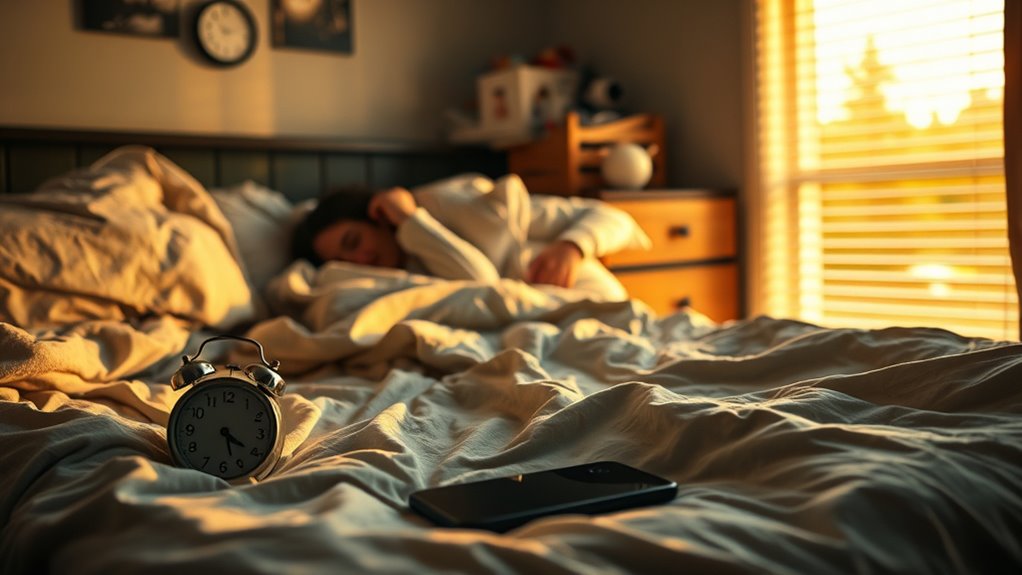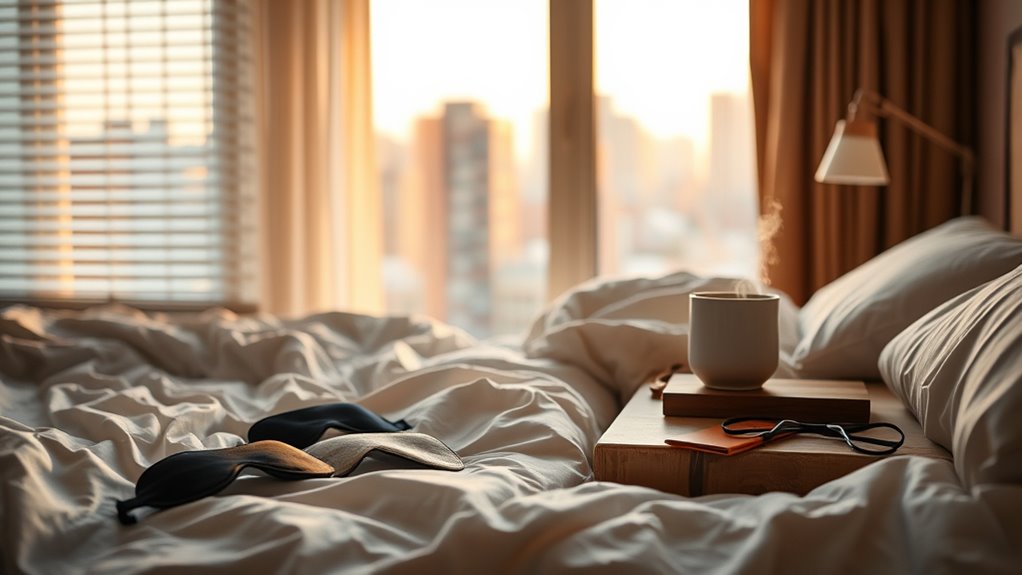Sleep inertia hits hardest on Mondays because your weekend routines often disrupt your internal clock, causing you to wake up groggy and disoriented. Irregular sleep times and catching up on sleep lead to a misaligned circadian rhythm, making it harder to feel alert in the morning. By understanding how your body responds, you can learn simple steps to reset your internal clock and wake up more refreshed. Keep going to discover effective strategies to beat Monday morning fog.
Key Takeaways
- Irregular weekend sleep schedules cause social jetlag, disrupting circadian rhythms and increasing Monday morning grogginess.
- Waking from deep sleep or REM rebound stages intensifies sleep inertia on Mondays.
- Lack of consistent wake-up times weakens circadian alignment, worsening morning disorientation.
- Reduced natural light exposure over the weekend hampers internal clock resetting, leading to stronger sleep inertia.
- Fixes include maintaining regular sleep routines, morning light exposure, and gentle alertness boosts like cold water or brisk walks.
Understanding the Science Behind Sleep Inertia

Understanding sleep inertia begins with knowing that it’s a temporary state of grogginess and cognitive impairment that occurs immediately after waking. This state is influenced by sleep hormone fluctuations, such as levels of adenosine and melatonin, which regulate sleep and wakefulness. When you wake up suddenly from deep sleep stages, especially REM sleep, your brain experiences a REM rebound—an increased tendency for REM sleep to occur after deprivation. This rebound can cause heightened grogginess and disorientation as your brain catches up on essential REM sleep. These biological processes disrupt your alertness and cognitive function right after waking, making it harder to jump into your day. Recognizing these underlying mechanisms helps you understand why sleep inertia is a natural, temporary phase that your body needs to recover from. Additionally, high refresh rates in sleep cycles can influence how quickly you transition from sleep to full alertness.
How Weekend Sleep Patterns Disrupt Your Internal Clock

Weekend sleep patterns can profoundly throw off your internal body clock, especially if you stay up late and sleep in on Saturdays and Sundays. This irregular schedule creates a mismatch called social jetlag, leading to increased sleep debt. As your body struggles to adjust, you might:
- Feel groggy during Monday mornings, fighting off sleep inertia.
- Experience difficulty falling asleep at your usual bedtime, disrupting your circadian rhythm.
- Rely on caffeine timing to stay alert, which can further confuse your internal clock.
- Incorporating consistent sleep schedules on weekends can significantly help in maintaining your body’s natural rhythm and reduce fatigue. These shifts make it harder for your body to synchronize with the natural light-dark cycle, intensifying Monday morning fatigue. To minimize this, maintaining consistent sleep and wake times on weekends helps stabilize your internal clock and reduces the impact of sleep debt.
The Impact of Circadian Rhythms on Monday Mornings

When your sleep schedule shifts on weekends, it can throw off your internal clock, making Monday mornings especially challenging. Circadian rhythms regulate your alertness and sleepiness by controlling sleep hormone fluctuations, like melatonin and cortisol. On Mondays, these hormones may be out of sync, causing you to feel groggy and disoriented. Morning light exposure plays an essential role in resetting your internal clock; natural light signals your brain that it’s time to wake up. Without adequate exposure, your circadian rhythm struggles to align with the new day, intensifying sleep inertia. Additionally, advances in AI in Education are exploring personalized strategies to help individuals better manage these disruptions. To minimize this disruption, getting sunlight early can help synchronize your internal clock, easing the transition into Monday and reducing the impact of sleep hormone fluctuations.
Practical Tips to Minimize Sleep Inertia on Mondays

To effectively reduce sleep inertia on Mondays, start by establishing a consistent wake-up time, even on weekends. This helps regulate your circadian rhythm and minimizes sleep deprivation, which worsens grogginess. To boost alertness quickly, consider these caffeine strategies:
- Sip a glass of cold water to stimulate your senses.
- Take a brisk walk outdoors to get natural light and oxygen.
- Use a splash of cold water on your face to jolt your system awake.
- Incorporate water resistance features into your morning routine, like a waterproof watch to track your activity and stay motivated.
Avoid over-relying on caffeine, as it can disrupt your sleep routine later. Instead, use small doses early in the morning to kickstart your alertness without causing jitters or crashes. These practical tips help you combat Monday morning grogginess while keeping sleep deprivation at bay.
Establishing a Consistent Sleep Routine for Weekday Wakefulness

Establishing a consistent sleep routine during the weekdays is essential for maintaining alertness and reducing sleep inertia on Mondays. To do this, prioritize your sleep environment by keeping your bedroom cool, dark, and quiet, which helps you fall asleep faster and enjoy restorative rest. Stick to a regular sleep schedule, going to bed and waking up at the same times each day, even on weekends. This consistency helps regulate your internal clock, making Monday mornings easier. Additionally, be mindful of caffeine timing; avoid consuming caffeine late in the day, as it can interfere with your sleep quality. Maintaining a consistent sleep routine helps support your circadian rhythm and improves overall sleep quality. By creating a reliable routine and optimizing your sleep environment, you set yourself up for better weekday wakefulness and a smoother start to the week.
Frequently Asked Questions
Can Certain Foods Help Reduce Sleep Inertia on Monday Mornings?
Certain foods can help reduce sleep inertia on Monday mornings if you choose sleep-promoting foods and implement smart breakfast strategies. Eating foods rich in protein, healthy fats, and complex carbs can boost alertness and energy levels. Incorporate options like eggs, nuts, and whole grains into your breakfast. These choices support wakefulness, making it easier to shake off grogginess and start your week energized and alert.
Does Age Affect How Strongly Sleep Inertia Impacts Individuals?
You might notice that age differences influence how strongly sleep inertia impacts you, as your sleep cycle variations change over time. Younger people often recover faster from inertia due to more resilient sleep cycles, while older individuals may experience prolonged grogginess. These age-related differences mean your body’s ability to shake off sleep inertia varies, highlighting the importance of tailored sleep routines to minimize its effects, especially as you age.
Are There Specific Sleep Disorders That Worsen Monday Morning Grogginess?
Imagine waking up each Monday, feeling like you’ve been hit by a truck—that’s morning grogginess caused by certain sleep disorder types. Conditions like sleep apnea or narcolepsy worsen morning grogginess causes, making it harder to shake off sleep inertia. These disorders disrupt restful sleep, intensifying sleep inertia effects. If you suspect a sleep disorder, addressing it can help reduce Monday morning grogginess and start your week with more energy and clarity.
How Does Exposure to Natural Light Influence Sleep Inertia Recovery?
Exposure to natural light helps you recover from sleep inertia faster by promoting circadian alignment. Light therapy in the morning signals your body it’s time to wake up, reducing grogginess. When you get sunlight, your brain produces less melatonin and boosts alertness. This natural cue resets your internal clock, making it easier to shake off sleep inertia and start the day more energized and focused.
Can Exercise During the Week Lessen Monday Morning Sleep Inertia?
You might notice that exercise during the week, like morning stretching or a quick jog, can help reduce Monday’s sleep inertia. Combining this with caffeine intake boosts alertness faster, making mornings smoother. Coincidentally, regular activity not only energizes your body but also trains it to wake up more easily. So, staying active throughout the week can soften that Monday fog, helping you start each day more refreshed and ready.
Conclusion
By gently aligning your sleep habits, you can make Monday mornings feel a little brighter. Embrace small changes to keep your internal clock happy, and over time, the tough wake-up calls will soften. Remember, a steady routine isn’t about perfection but progress. With patience and consistency, you’ll find yourself easing into the week with more energy and ease, turning those sluggish starts into smoother, more enjoyable mornings.









